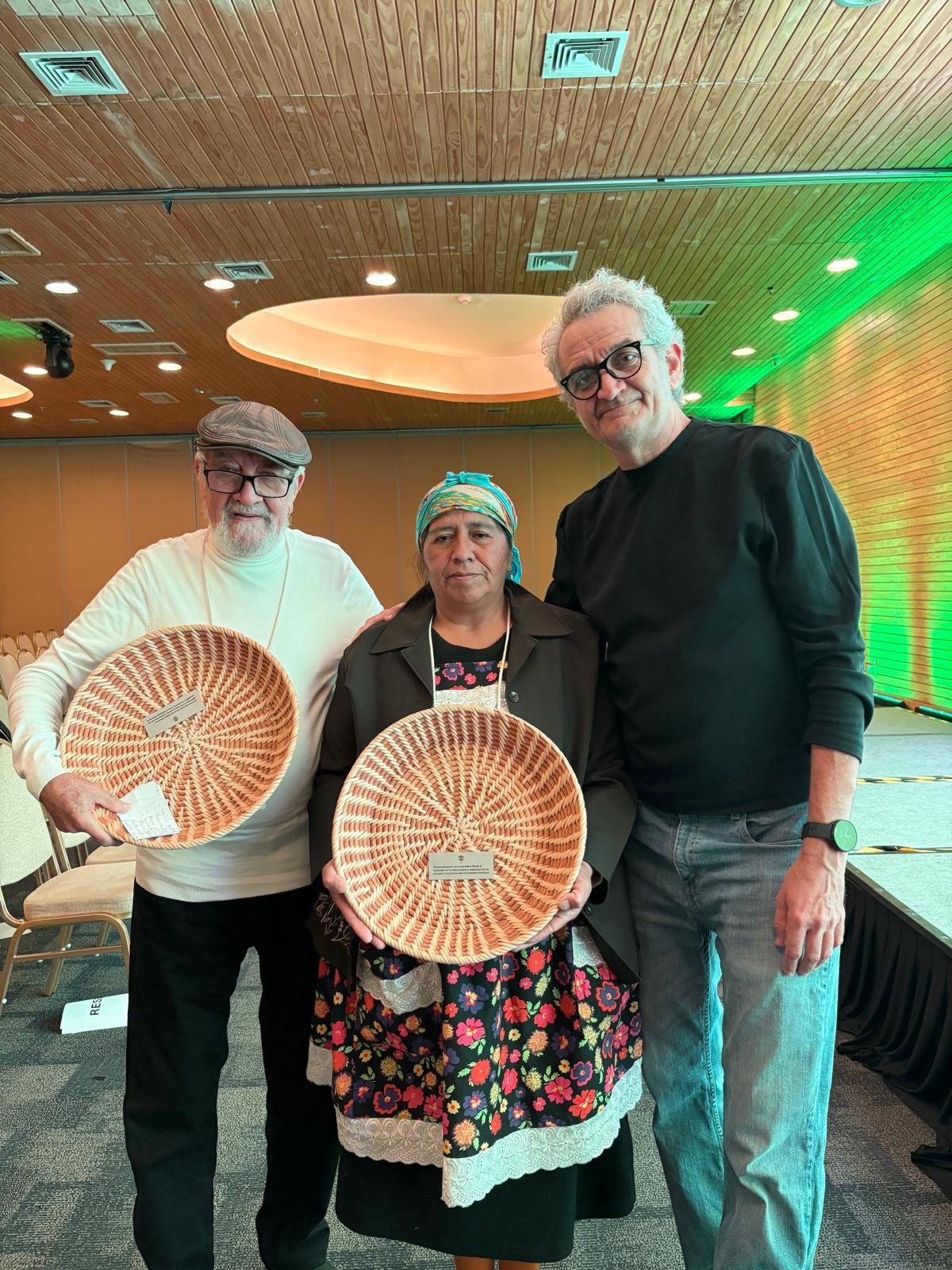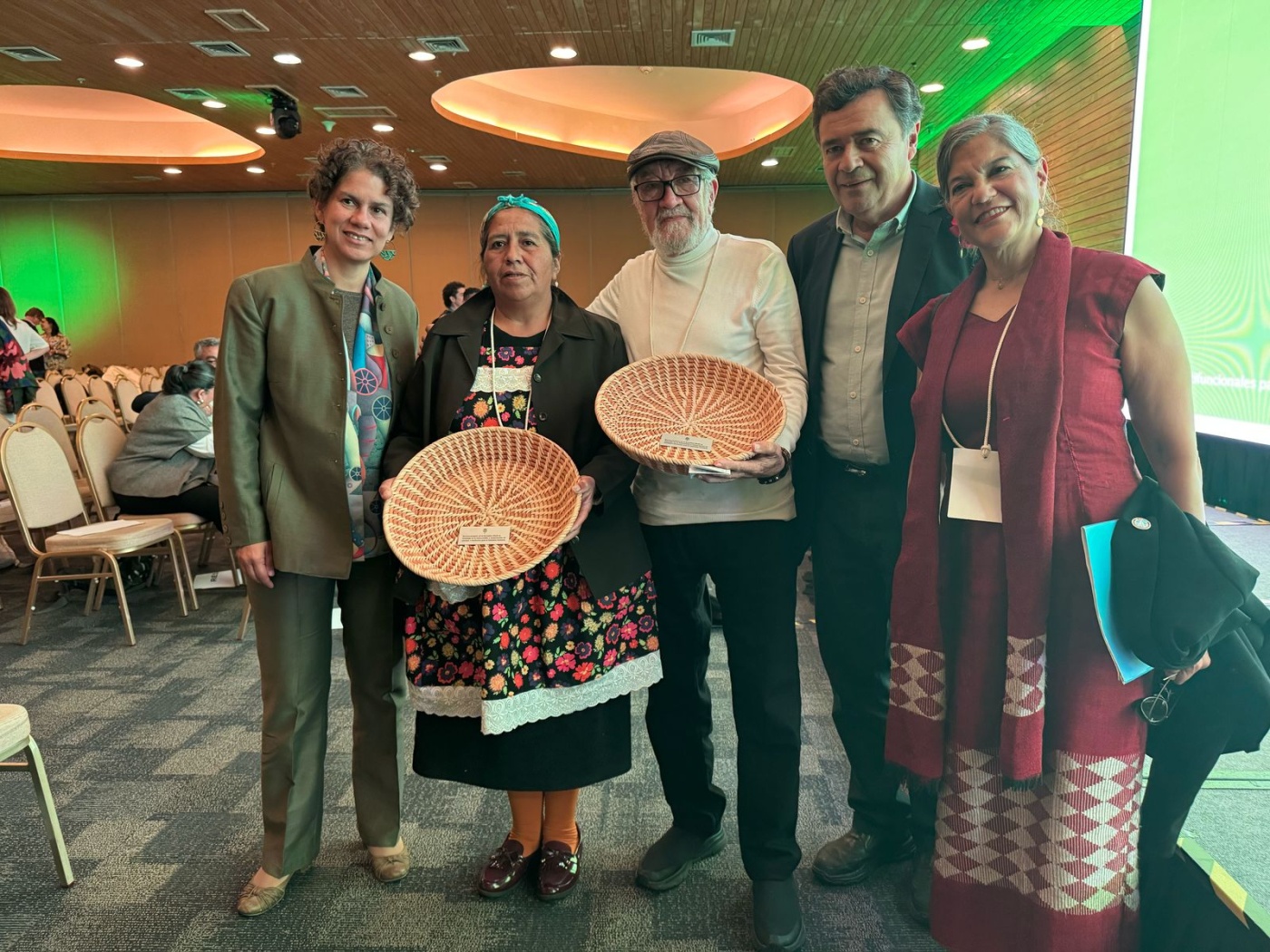This April, at the 2025 Initiative 20x20 Annual Meeting in Puerto Varas, Chile, two revolutionaries were honored for their commitment to restoring Latin America’s degraded landscapes.
One is a Mapuche farmer and grassroots leader who sows ancestral seeds and advocates for the rights of Indigenous people. The other is a forest engineer and policy strategist whose work spans multiple regions and has inspired many. Together, Blanca Melín Aniñir and Dr. Ronnie de Camino Velozo embody the idea that restoration is not merely ecological—it is cultural, political, and deeply human.
At each Annual Meeting, the Initiative 20x20 Awards honor those doing extraordinary work to restore degraded landscapes across Latin America. Selected by the Initiative 20x20 secretariat and the country host of the meeting, the award recognizes those who demonstrate exceptional commitment to land restoration—whether through grassroots action, policy leadership, or scientific innovation. This year, the award focuses on leadership, aiming to spotlight and inspire restoration champions whose efforts are transforming ecosystems and communities. Awards are presented at the Initiative 20x20 Annual Meeting to celebrate the power of individual leadership in driving a more sustainable future for the region.
Keeper of Seeds, Guardian of Indigenous Wisdom
Blanca Melín Aniñir restores from the ground up—seed by seed, story by story. A farmer in the Chilean province of Arauco, Blanca is part of the Mapuche community, and her approach to restoration is deeply rooted in their ancestral wisdom. For over two decades, she has rescued native seeds—quinoa, maize, beans, and wheat—and through trafkintun, traditional gatherings where Indigenous knowledge is shared and kept alive.
Born in Cañete, southern Chile, she grew up witnessing the vital role nature played in sustaining her community. Those early experiences shaped her belief that true restoration begins with people, and that lasting change happens when local communities are empowered to take the lead.
Her activism threads together land restoration, community driven food systems, and preservation of cultural identity. But her work doesn’t stop at the farm. Blanca is a powerful advocate for rural and Indigenous women. Since 2016, she has been an active member of the Mesa Provincial de Mujeres Rurales e Indígenas of Arauco Province. This roundtable brings together women from Arauco, mostly from rural and Indigenous communities, and provides space for them to share ideas, exchange seeds and learn about sustainable land practices.
Through this platform, and her leadership in the Global Environment Facility (GEF) Landscape Restoration Project and local governance committees, she continues to elevate the role of rural women and Indigenous communities in shaping restoration policies that respect local realities.
“The importance of leadership in restoration is undeniable,” said Contanza Troppa, who presented Blanca’s award on behalf of Chile’s National Forest Corporation (CONAF). “Recognizing and supporting the leadership of women is essential to advance towards a more equitable, sustainable, and sustainable future.”
Blanca’s guiding light is küme mogen—the Mapuche concept of "the good life," where harmony with the land is inseparable from spiritual and communal well-being.
“I think that Mapuche culture could be incorporated into food sovereignty—or the Mapuche kimün, as I call it,” she says. “The küme mogen, the good life, is the same as food sovereignty. I think that a country without culture is nothing.”
Her work defies easy categorization. It is political and poetic, spiritual and strategic. She restores not just soil, but soul.
The Architect of Restoration Policy
While Blanca’s restoration draws deeply from indigenous knowledge and grassroots strength, Dr. Ronnie de Camino Velozo lays the groundwork by providing policy frameworks, revolutionary approaches of learning, network leadership and scientific research that allows such efforts to thrive.
He speaks about land restoration with the authority of decades of experience, blending rigorous scholarship with the passion of an artist and the clarity of hard-earned evidence. A Chilean forest engineer with postgraduate training and postdoctoral residency in Germany, he is widely regarded as one of the region’s foremost thinkers on sustainable land use.
He helped design Chile’s first national reforestation plan, implemented a half-million-hectare reforestation program in Venezuela, and went on to become a cornerstone of CATIE in Costa Rica—serving as professor, program director, and eventually deputy general director. He also served as president of the Ibero-American chapter of the Model Forests Network from 2008 to 2017, helping to engineer a movement that reinforces good practices and governance among landscape leaders.
Ronnie was instrumental in the early days of Initiative 20x20, helping to inspire, shape and draw political support to materialize its founding vision of restoring millions of hectares of degraded land across Latin America and the Caribbean.
He published prolifically—over 150 scientific works—and advised almost as widely: from the World Bank to FAO, from CIFOR to the UN. But perhaps more importantly, he listened. He worked with Indigenous communities in Mexico, Guatemala, Venezuela, and beyond, always advocating for the voices of local communities to be heard. In between, he painted, sculpted, and, more recently, posted poems on TikTok—his verses reaching a generation that will carry on his work in the field.
But his most enduring legacy lies in the human infrastructure he has built: the networks of students, Indigenous leaders, and policymakers he continues to mentor. Over the years, he has hosted reading groups in scientific institutions to discuss the link between research and restoration and helped reclaim model forests and rural landscapes—not just for trees, but for people.
“I am very grateful for this recognition. I have dedicated much of my life to working for forests, landscapes, and the people who live in them. Along the way, I had the opportunity to collaborate with many communities, organizations, and institutions that believe restoration is not just a technical task, but a social and human process,” said Ronnie during the ceremony.
“This award is not only for me, but for everyone who believes it is possible to build a greener, fairer, and more sustainable future from the ground up.”
Even now, at 83 years old, an age when most professionals retire to quieter pursuits, Ronnie remains active—as Senior Advisor to the Forest and Climate Change Fund in Luxembourg, an artist embracing emerging platforms to communicate, and as a reminder that forestry is as much about values as it is about value chains.
From Local Roots to Regional Change
The selection of Blanca and Ronnie as recipients of the 2025 Leadership Award goes beyond symbolism—it reflects a growing shift in how restoration is viewed across Latin America. It is no longer confined to top-down policies, academic definitions or grassroots efforts alone; restoration today requires a full spectrum of voices and approaches. By honoring these two leaders, Initiative 20x20 and its partners affirm that successful restoration must unite policymakers, local communities, economists, artists, and everyday stewards of the land.
Both Blanca and Ronnie reinforce the idea that landscapes are not passive backdrops to human action—they are living systems shaped by memory, governance, and culture. And they will be restored not just by planting trees, but by planting ideas—and hope—in the minds of those who care for them.

Photos by MMA Chile
